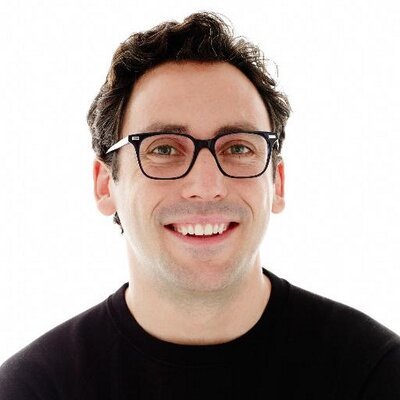Neil Blumenthal
Neil Blumenthal is a co-founder and co-CEO of Warby Parker, a transformative lifestyle brand that offers designer eyewear at a revolutionary price, while leading the way for socially conscious businesses. In 2015, Fast Company named Warby Parker the most innovative company in the world.
Prior to launching Warby Parker in 2010, Neil served as director of VisionSpring, a nonprofit social enterprise that trains low-income women to start their own businesses selling affordable eyeglasses to individuals living on less than $4 per day in developing countries.
He was named a Young Global Leader by the World Economic Forum and one of the 100 Most Creative People in Business by Fast Company. He serves on the board of RxArt and on the United Nations Foundation Global Entrepreneurs Council.
A native of New York City, Neil received his BA from Tufts University and his MBA from The Wharton School of the University of Pennsylvania.
This is from an interview with Neil:
How did your time at Tufts influence your later work, both with VisionSpring and Warby Parker?
I think that Tufts in particular takes a global view and very much takes a view of action. So it’s one thing to be aware of challenges throughout the world, and it’s another thing to take steps to work to resolve those challenges and I think that’s a very Tufts thing, something that’s prevalent throughout the Tufts community. And I think about my classmates and it’s often a Tufts student that was the first to go out and not just pay lip service to changing the world but actually working to make it happen. I [studied] abroad, I went to Argentina and Spain, immediately after school, it was actually Sherman [Teichman] who helped me think about what, at the moment, I was most passionate about, and at the time it was international affairs and like many Tufts students I was an International Relations major, and a dual major with history. I wanted to, in the most basic terms, get people to stop killing each other so we could focus on the big issues like health and education, so I went over to the Netherlands, and did some graduate coursework on negotiation and conflict resolution, returned to New York to work at a think tank that came up with policies to resolve deadly conflict, before meeting Jordan Kassalow and starting at VisionSpring.
Did you have a favorite class or professor at Tufts?
I think there were two classes. One was EPIIC, through the Institute for Global Leadership with Sherman Teichman. And then the second, this was a class called The Nuclear Age, and it was taught by Martin Sherwin and was also co-taught actually with a physics professor, so it was both sort of a history and a physics credit.
Any words of advice for the young and naïve?
One is the obvious one, always follow your passion. But in order to do that you need to discover what that is and part of that is doing things that you may like or dislike, to really get at the heart of it. But you should be thinking that everything you do, hopefully, opens more doors and if you have that frame of reference, hopefully you’ll create more and more opportunities for yourself.
This article from moneyinc on 10 things you didn’t know about Neil speaks to his interest in foreign policy and conflict resolution. These comments are germane to what we did together when he was an undergraduate.
6. He Was Passionate about Foreign Policy
In an interview with startups.com, the CEO said he had been passionate about foreign policy and global affairs; therefore, he majored in International Relations and History at Tufts University, Massachusetts. He was hopeful that he would change the world by working at the State Department, so he took the Foreign Service exam. He later worked on negotiations in the Netherlands, believing that the only way he would let people focus on significant issues like health and education was to stop people from killing each other.
9. He was Disappointed after Learning about How Foreign Policy Works
While Blumenthal wanted to influence change directly, he realized that coming up with policies that would never be implemented was a waste of time. He became disillusioned while working at a think tank because it dawned on him he would be sitting in an office for the rest of his career, developing policies and passing them on to those who were supposed to implement them. His need to solve problems directly, therefore, led him to think about becoming an entrepreneur.
Neil recently delivered the COVID-delayed Tufts class of 2020 commencement talk and he called me the night before to reminisce.
Beyond our wonderful teacher/mentor, and student relationship, there were some other truly unexpected pivotal moments in my life with Neil.
When my son Nathaniel was considering business school, I introduced him to Neil who had graduated Wharton and was already taking Warby Parker on its great trajectory. He reinforced Nathaniel's decision. He ultimately applied and graduated from Columbia Business School.
Five years ago, Neil alerted Nathaniel that he was going to deliver a talk on entrepreneurship at CBS. Nathaniel arrived at the Columbia auditorium early, deposited his backpack under a prime seat and left. When he returned a winsome young woman, who was considering CBS had taken his chair. With the auditorium still quite empty, with people slowly gathering, Nathaniel sat down next to her. Now five years later, they are husband and wife.
I joke about them as "the lion and the lioness," as she graduated Columbia's graduate school of Public and International Affairs (SIPA).
Kelly is Director of Projects at IUNU, (“you knew”), an industrial computer vision company connecting plants, facilities, and people through a single interface, LUNA turns commercial greenhouses into precise, predictable, demand-based manufacturers.
Nathaniel is currently the Head of Strategy & Business Development at Master & Dynamic. and the creator of Stance.


